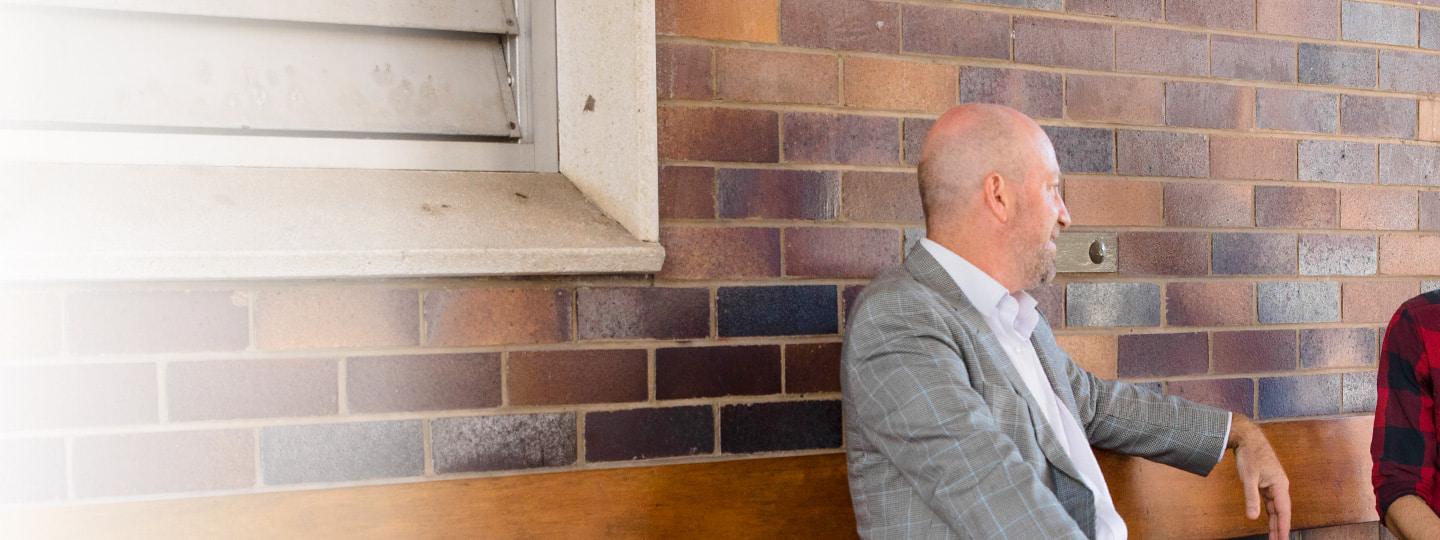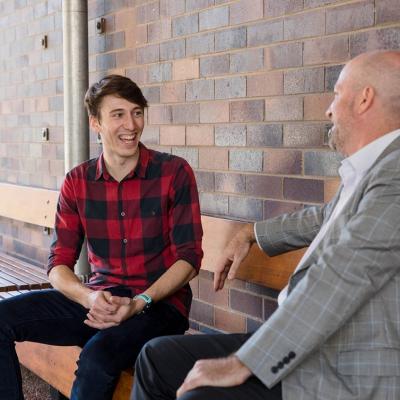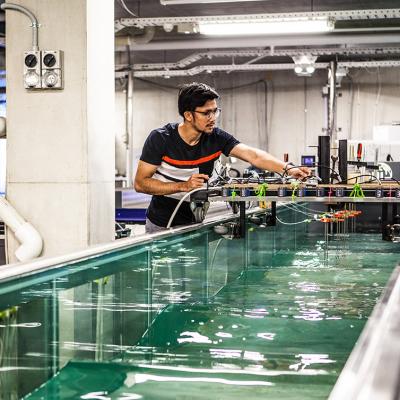Ever wondered what it's like to do a PhD in engineering at UQ? Choosing the right pathway can be hard, especially when there are so many unknowns out there.
How do I choose the right PhD supervisor? Does my PhD topic stay the same throughout? Are there any PhD scholarships available?
PhD candidate Jordan and his supervisor Professor Darren Martin have teamed up to answer some of your questions and help you decide what’s right for you.
What's your favourite thing about being a PhD supervisor?
Darren: I really enjoy getting to know new candidates, listening more than speaking and not making hard decisions about the candidature before I get to know the candidate. Then it’s a work in progress all the way through.
Why did you choose to do a PhD?
Jordan: It wasn't an easy choice. There’s always a lot of questions about whether it's the right choice as it’s three and a half years, so you really have to consider if you want to commit to that. But I like the idea of diving deep into a project, really investing myself in the nuances of it and getting a really nice output in the end that you can be proud of.
On the fence about whether undertaking a PhD will be worth it for you? Gain some insights from UQ PhD graduates and discover the benefits of pursuing one.
What engineering PhD scholarship have you been awarded and how did you find out about it?
Jordan: I have the RTP scholarship that the government gives PhD students, and I actually have an additional top up scholarship that has been awarded to me from the Grains Research and Development Council, a government body. I did some research online, found the scholarship, and applied.
The great thing about this is that there's an operational cost element so I can put some money towards buying equipment for the lab, testing some of my samples, as well as travel costs. I've had the chance to go over to France and Spain this year, and do a small industry placement in France. It's provided a great opportunity to do some additional work overseas.
Darren: Jordan took the initiative to write that proposal. It was an extraordinarily good proposal so it's always good to see students taking initiative.
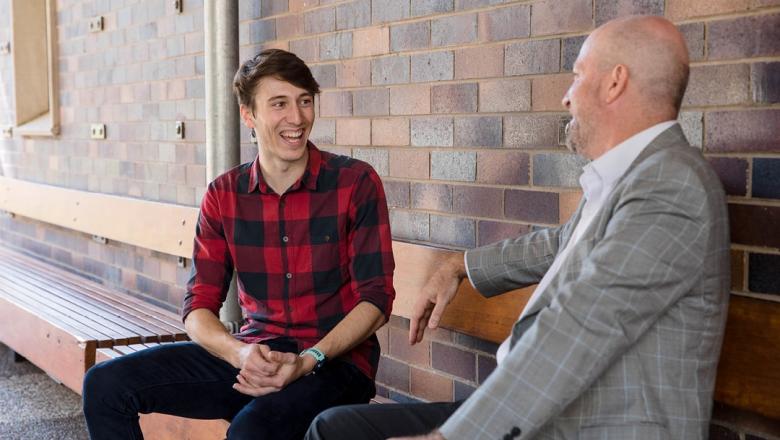
What made you decide to be Jordan's supervisor?
Darren: Well, I think that was more Jordan's decision but when we first met, I was impressed. I think his background doing dual science and engineering put him in good stead because scientists do think differently to engineers. He came across as articulate and quite an expansive thinker, and that was a very good fit for the project he's walked into.
Find out more about how to find the right PhD supervisor for you.
How is your PhD in engineering different from your undergraduate studies?
Jordan: It's different in some ways, and the same in others. There's definitely some of the same challenges and some degree of stress involved in both undergrad and PhD.
The difference with a PhD is that you have more freedom to drive your own project, make a name for yourself, take responsibility and create your future. In the undergraduate you sort of go through the motions and get the degree. So, I think it's about ownership and responsibility in the PhD.
What's the best advice you would give to someone who's considering doing a PhD at UQ?
Darren: It’s a higher degree, it’s another substantial level of training in your on-going lifelong learning but in the type of work that we do, it's an opportunity to invent, to discover and to engage with stakeholders well outside the university, to be an inventor, to potentially even commercialise and create a future for yourself.
"A PhD can be a platform for so much more than just a piece of paper."
Why did you choose to do your PhD at UQ?
Jordan: I've been at UQ my whole post-secondary schooling and so I have contacts and a network that I connected with to find a project. It made a lot of sense to stay. UQ has been great for being connected to different faculties and not just being isolated and in one little bubble but doing that transdisciplinary research and connecting different fields together.
Find out more about the benefits of studying a PhD at UQ.
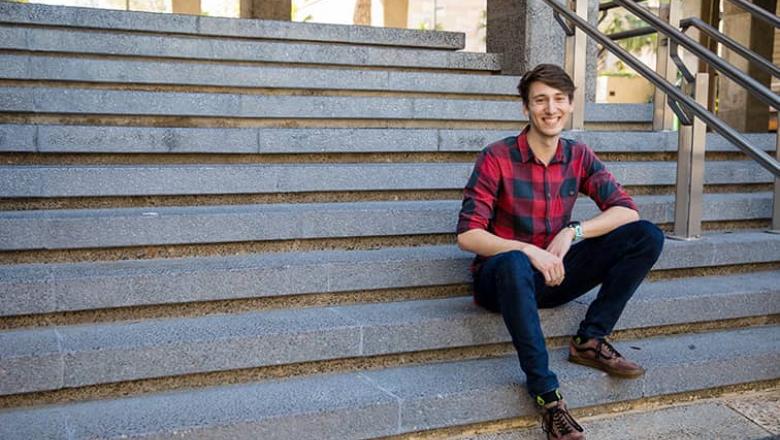
Why are you passionate about your research?
Darren: We approach things a little differently and Jordan's been in the team long enough to see that we tend to find an area that catches our attention, and that we think could be developed to a point where it makes a difference, where it has impact. Traditionally in my group there's been 3 of these themes over the space of 25 years and they tend to run for 10 to 15 years.
What I like about that is if you hang around in an area and study it and learn it and you have a group of people with diverse skills, when all of those people work together on a big problem, the likelihood of doing something that benefits people outside the university and having impact goes up. I think orders of magnitude and that's what attracts me to my job and working at UQ.
How do you think your PhD will benefit you, both professionally and personally?
Jordan: This is one of the reasons why I did a PhD. I saw it had the potential to create a body of work for myself, to create a name in the field, as well as develop some extra professional skills that I wouldn't have the chance to do otherwise. Skills like science communication, writing, research and experimental planning and also the extra things like stakeholder engagement. I think a big part of our research group is engaging a wide variety of different players on the path to developing products.
How to get a PhD in engineering
Read our complete guide on how to get a PhD and browse available PhD projects on offer.
How has supervising PhD candidates assisted your work as Chief Scientific Officer for the startup company TenasiTech Pty Ltd?
Darren: TenasiTech was formed in the mid-2000s, and it was the product of the work of 3 PhD students earlier in my career – we founded that company. We're all inventors in that company, and it was about making little ceramic plate-like nanoparticles and putting them into transparent plastics, like Perspex and Plexiglas and things like that to make those materials more scratch resistant.
The company consumed us as a research group for 15 years. I think there were perhaps 8 or 9 PhD graduates who were connected to that work. Some of those graduates ended up working as postdocs in the group and continuing on their career, and 2 of them still work with me today, many years later.
PhD students heavily influenced the trajectory and the success of that company. Even when the company was very commercial and doing things outside the university there were always PhD students working on the fundamental science and the questions that we were bringing back from the factory.
Did your work in industry at AIBN's Spinifex Nanocellulose Downstream Pilot Facility draw you to postgraduate study?
Jordan: That’s a bit of a mouthful, I’ll just call it the pilot plant. I spent a couple months before I started the PhD on the pilot plant and it really helped me frame the context of the research. On one hand, it was really good knowing the equipment I was using and getting an understanding of that before I started the PhD. On the other hand, I could step back and look at the challenges of the field in general. So, the details of the equipment and the broad context of the field, both of those things really helped from working at the pilot plant.
How did you pitch your PhD topic?
Jordan: It was a bit of a challenge, I had to pitch it not only to Darren as a material scientist but also to plant scientists that we were collaborating with, so I had to talk about both the different aspects of the topic I wanted to pitch.
The first step was getting an understanding of both sides, then pitching it in a way that they could get behind and understand. It was a bit of a science communication challenge, but I think it was a good way to get a better understanding of the topic.
Your research career begins here at UQ. Explore our scholarships or apply now.

